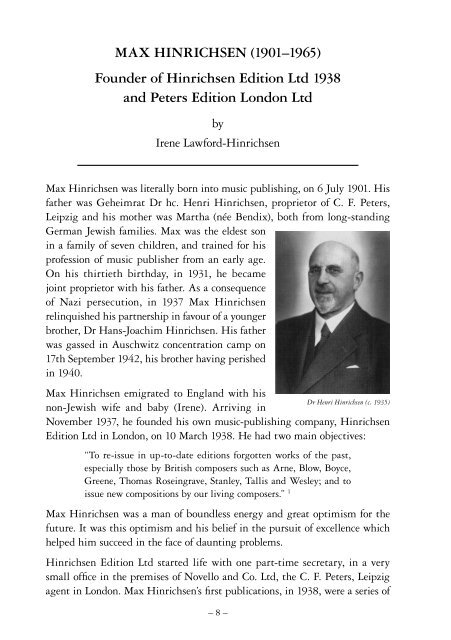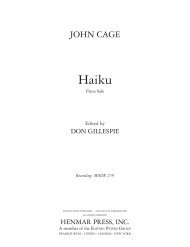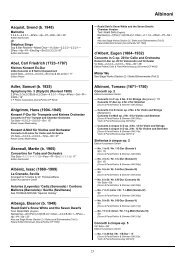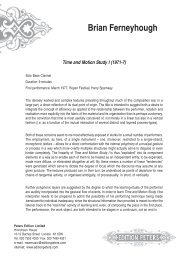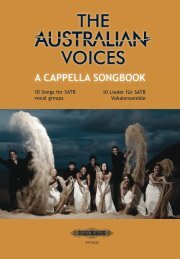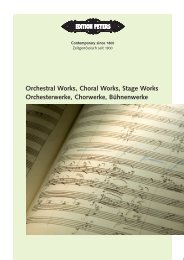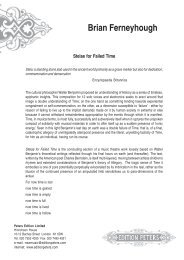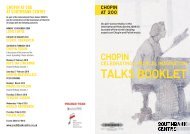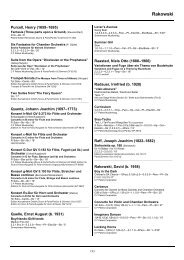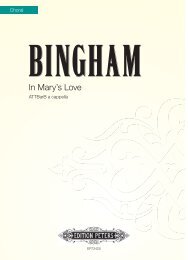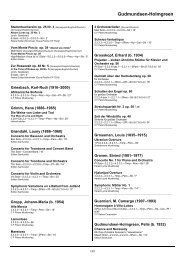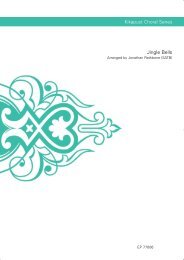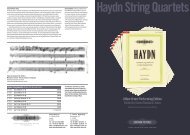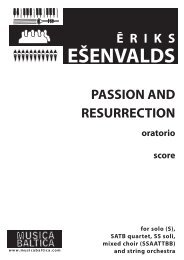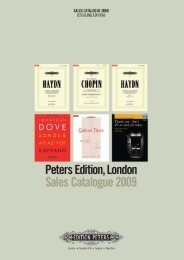MAX HINRICHSEN - Sheet Music Publishers
MAX HINRICHSEN - Sheet Music Publishers
MAX HINRICHSEN - Sheet Music Publishers
Create successful ePaper yourself
Turn your PDF publications into a flip-book with our unique Google optimized e-Paper software.
<strong>MAX</strong> <strong>HINRICHSEN</strong> (1901–1965)<br />
Founder of Hinrichsen Edition Ltd 1938<br />
and Peters Edition London Ltd<br />
by<br />
Irene Lawford-Hinrichsen<br />
Max Hinrichsen was literally born into music publishing, on 6 July 1901. His<br />
father was Geheimrat Dr hc. Henri Hinrichsen, proprietor of C. F. Peters,<br />
Leipzig and his mother was Martha (née Bendix), both from long-standing<br />
German Jewish families. Max was the eldest son<br />
in a family of seven children, and trained for his<br />
profession of music publisher from an early age.<br />
On his thirtieth birthday, in 1931, he became<br />
joint proprietor with his father. As a consequence<br />
of Nazi persecution, in 1937 Max Hinrichsen<br />
relinquished his partnership in favour of a younger<br />
brother, Dr Hans-Joachim Hinrichsen. His father<br />
was gassed in Auschwitz concentration camp on<br />
17th September 1942, his brother having perished<br />
in 1940.<br />
Max Hinrichsen emigrated to England with his<br />
non-Jewish wife and baby (Irene). Arriving in<br />
November 1937, he founded his own music-publishing company, Hinrichsen<br />
Edition Ltd in London, on 10 March 1938. He had two main objectives:<br />
“To re-issue in up-to-date editions forgotten works of the past,<br />
especially those by British composers such as Arne, Blow, Boyce,<br />
Greene, Thomas Roseingrave, Stanley, Tallis and Wesley; and to<br />
issue new compositions by our living composers.” 1<br />
Max Hinrichsen was a man of boundless energy and great optimism for the<br />
future. It was this optimism and his belief in the pursuit of excellence which<br />
helped him succeed in the face of daunting problems.<br />
Hinrichsen Edition Ltd started life with one part-time secretary, in a very<br />
small office in the premises of Novello and Co. Ltd, the C. F. Peters, Leipzig<br />
agent in London. Max Hinrichsen’s first publications, in 1938, were a series of<br />
– 8 –<br />
Dr Henri Hinrichsen (c. 1935)
easy original compositions for piano, by classical composers and edited by Alec<br />
Rowley. Hinrichsen Edition numbers 1–7 covered respectively: Beethoven,<br />
Chopin, Haydn, Mozart, Schubert and Schumann. In publishing this series he<br />
was acknowledging the pioneering achievements of his great-uncle, Dr. Max<br />
Abraham’s “Edition Peters” series of the classics, launched in Leipzig some 70<br />
years earlier, in 1867.<br />
The outbreak of war in 1939 brought considerable difficulties for publishing,<br />
not least because paper was rationed, so Max published booklets and smallscale<br />
works. He also played his part in the war effort. From 1942–1948 he<br />
served as Editor (for the London Regional Committee for Education among<br />
H.M. Forces) of a weekly Newsletter, On Leave in London, issued for the troops.<br />
It might well have been this which contributed to the fact that he was one of<br />
the very few German emigrés and refugees not to have been interned during<br />
the war.<br />
Drawing on his past experience, he founded Hinrichsen’s Artist Management<br />
and Concert Direction in 1942, arranging concerts throughout the country and<br />
helping many young musicians as well as<br />
representing established musicians.<br />
Business expanded and in 1946 Hinrichsen<br />
Edition Ltd, moved to larger premises at<br />
25 Museum Street, London.<br />
As a Jewish émigré from Germany, Max<br />
Hinrichsen had become stateless with<br />
the issuance of the “Eleventh Ordinance”<br />
regarding the Law of Reich Citizenship,<br />
promulgated on 25 November 1941, which<br />
deprived non-resident Jews of citizenship<br />
of the German Reich. Resident in England<br />
and awaiting British citizenship, he was<br />
granted all privileges of British citizens<br />
Martha Hinrichsen (c. 1935)<br />
except the right of free travel. Hence he<br />
could not travel to Leipzig in 1945 to help his brother Walter try to reclaim<br />
the family property. His Naturalization was held up owing to the war, when<br />
his official status was that of an “enemy alien”. Max Hinrichsen was finally<br />
granted British citizenship by Naturalization on 1 May 1947 and was issued<br />
with his first British passport two months later. He could then travel to<br />
Germany to continue to disentangle the affairs of C. F. Peters, which had<br />
– 9 –
een confiscated from his father in a process known as “Aryanization”, and to<br />
promote his business all over the world.<br />
Tall, clean-shaven and with a prematurely bald head and brown eyes peering<br />
through spectacles, Max Hinrichsen was kind and generous of spirit. Dr Alec<br />
Hyatt King, the scholar and musicologist, and former Superintendent of <strong>Music</strong><br />
at the British Museum, described him thus:<br />
“He always seemed somehow rather larger than life – jovial in<br />
the true sense of the word: he was impulsive, enthusiastic and<br />
extraordinarily generous: he was unfailingly helpful, and if he<br />
said he’d do something, he never failed to. Above all he was a<br />
realist. In a letter to me in 1961, sending the 11th <strong>Music</strong> Book, he<br />
wrote ‘I, as a publisher, think we can be quite satisfied. Something<br />
perfect does not exist, especially nowadays in connection with the<br />
publisher’s profession.’ His words still ring true today – it was<br />
always swings and roundabouts. Max sometimes backed losers,<br />
but he backed far more winners.” 2<br />
– 10 –<br />
Max Hinrichsen
The two men first met towards the end of the war, when Max was planning<br />
the first of his series of Hinrichsen’s <strong>Music</strong>al Year Book, which appeared in 1944.<br />
In the compilation of these books he was in some way emulating the Peters<br />
<strong>Music</strong> Library Year Books which he had helped edit between 1931 and 1937<br />
in Leipzig. They were meticulously compiled reference works listing many<br />
aspects of musical life and containing a wealth of information, learned articles<br />
and analyses, referred to and still highly respected to this day. Nine books were<br />
issued between 1944 and 1961, though the title was changed when it became<br />
apparent that they would not appear annually. The final three volumes took<br />
on a completely different nature:<br />
Vol. I Hinrichsen’s Year Book 1944<br />
II–III Hinrichsen’s <strong>Music</strong>al Year Book 1945–46<br />
IV–V Hinrichsen’s <strong>Music</strong>al Year Book 1947–48<br />
VI Hinrichsen’s <strong>Music</strong>al Year Book 1948–50<br />
VII <strong>Music</strong> Book. <strong>Music</strong>al Year Book Vol. VII 1952<br />
VIII Eighth <strong>Music</strong> Book. <strong>Music</strong>al Year Book Vol. VIII 1956<br />
IX Ninth <strong>Music</strong> Book. <strong>Music</strong>al Year Book Vol. IX 1956<br />
X Organ and Choral Aspects and Prospects. <strong>Music</strong>al Year<br />
Book Vol. X 1958<br />
XI <strong>Music</strong> Libraries and Instruments. Hinrichsen’s Eleventh<br />
<strong>Music</strong> Book 1961<br />
Max Hinrichsen worked long hours with tremendous dedication, building<br />
up his business and publishing a great deal of sheet music with meticulous<br />
attention to detail. At that time, the company was relatively small and he was<br />
not only publisher, but also editor, proof reader, publicity director, advertising<br />
manager and compiler of catalogues, as well as filling many subsidiary<br />
positions! The strain caused the breakup of his marriage in 1949.<br />
He was a particularly keen publisher of organ music. His series From Tallis to<br />
Wesley comprised several volumes of early English music and was welcomed<br />
by keyboard players everywhere. The organist Gordon Phillips was one of the<br />
main editors of organ music; his enthusiasm led Max Hinrichsen to become an<br />
active member of the Incorporated Association of Organists and the London<br />
Association of Organists, the Organ Club and the Organ <strong>Music</strong> Society.<br />
Becoming aware that there was little original music for brass bands, Max<br />
Hinrichsen set about commissioning and publishing new works for this very<br />
popular form of music-making in Great Britain; one of his main advisers and<br />
arrangers was the tuba player, Philip Catelinet. He became very involved<br />
– 11 –
with the National School Brass Band Association of which he was a Council<br />
Member from 1952, becoming Vice President in 1955.<br />
He published music by contemporary British composers such as Richard<br />
Arnell, Arthur Butterworth, J. H. Reginald Dixon, Gerald Finzi, Manuel<br />
Frankell, Hans Gal, Berthold Goldschmidt, Daniel Jones, William S. Lloyd<br />
Webber, Elizabeth Maconchy, Robin Orr, Thomas B. Pitfield, Reginald<br />
Redman, Reginald Smith-Brindle, Peter Tahourdin and Peter Wishart, as well<br />
as by foreign composers including Otto Klemperer and Serge Lancen.<br />
He counted amongst his advisers and editors for his new editions of classical<br />
music such eminent musicians and musicologists as Felix Aprahamian,<br />
Howard Ferguson, Hermann Keller, Alec Hyatt King, Yehudi Menuhin,<br />
Donald Mitchell, Stanley Sadie, Denis Stevens, William S. Lloyd Webber,<br />
and many more. He published books, amongst which were those of Henry<br />
George Farmer and Inglis Gundry. Wilhelm Weismann, the musicologist and<br />
editor at C. F. Peters, Leipzig since 1929, edited numerous works for him from<br />
Leipzig.<br />
Greatly involved in every aspect of music publishing, Max Hinrichsen followed<br />
in his father’s footsteps taking an active lead in various associations. Apart from<br />
those already mentioned, he belonged to the American <strong>Music</strong>ological Society,<br />
the Dolmetsch Foundation, the Galpin Society, Holy Trinity Choral Society<br />
(of which he was the Vice President), the Hymn Society of Great Britain, the<br />
International Association of <strong>Music</strong> Libraries, the Internationale Gesellschaft<br />
für Musikwissenschaft, the Mechanical Copyright Protection Societies, the<br />
<strong>Music</strong> Trades Association, the National Book League, the Performing Rights<br />
Society, the <strong>Publishers</strong>’ Association, the Royal <strong>Music</strong>al Association, the Viola<br />
da Gamba Society (as Vice President), the Society of Authors and more.<br />
From 1948 he was a member of the Arts Committee of the London Council of<br />
Social Service; from 1962 a Council Member and Vice President of the British<br />
Copyright Protection Association, London; and from 1963 a Deputy Member<br />
of the Conseil d’Administration du Bureau de l’Edition Mecanique, BIEM,<br />
Paris.<br />
On his arrival in Great Britain, Max Hinrichsen had been working with Novello<br />
and Co. Ltd, as the personal representative of the Edition Peters. When the war<br />
ended in 1945, he became more and more frustrated at not being permitted to<br />
publish the music himself, which was his birthright. Eventually he did publish<br />
the all-time best-seller in the C. F. Peters catalogue, Christian Sinding’s Rustle<br />
– 12 –
of Spring, as well as some other works. This led to him becoming embroiled<br />
in lengthy, time-consuming and stressful legal actions. Novello and Co.,<br />
claiming that he had no right to publish the music, took legal action against<br />
Hinrichsen Edition Ltd, for infringement of their copyright. They argued that<br />
Max Hinrichsen was not the owner of the copyright because his father had lost<br />
it, and that they, as licensees under the emergency legislation, were the sole<br />
persons entitled to publish the works in England. The judgements are fully<br />
re-printed in the Chancery Division records. 3<br />
Max Hinrichsen and Hinrichsen Edition Ltd, with the aid of a top KC, Pascoe<br />
Hayward KC and Skone James, successfully resisted the claims of Novello and<br />
Co. Ltd for infringement of copyright in the works Rustle of Spring by Sinding<br />
and Sonatinas by Clementi – Ruthardt. Bridging the years 1950 and 1951, the<br />
case lasted 19 days before Justice Wynn Parry in the Chancery Division of the<br />
High Court. Novello and Co. did not like the result and appealed against Mr<br />
Justice Wynn Parry’s judgement. The appeal occupied four days in the Court<br />
of Appeal in June 1951 before the Master of the Rolls, Sir Raymond Evershed<br />
and Lords Justices Jenkins and Birkett. The appeal was dismissed. Again Max<br />
Hinrichsen was successful, even though Novello and Co. had Sir Andrew Clark,<br />
KC leading Mr Guy Aldous against Hinrichsen’s team of Pascoe Hayward KC<br />
and Skone James, while the Court of Appeal called upon Mr Stuart Bevan, the<br />
Comptroller-General for assistance in arguing the appeal.<br />
In his summing up of the first case on 21 February 1951, Mr Justice Wynn<br />
Parry made it clear that Nazi decrees did not make law in England. The<br />
English copyright was never lost by Henri Hinrichsen, and his son Max was<br />
now the true owner:<br />
“The courts of this country will not give effect, so far as regards<br />
assets within their jurisdiction, to the law of a foreign country<br />
which is confiscatory in policy . . . Novello and Co. have no merits<br />
in this case. I would have been quite unwilling in the interests<br />
of justice to allow the plaintiffs to succeed in depriving the<br />
Hinrichsen family, who have already suffered enough, of their<br />
inheritance.”<br />
Max Hinrichsen was vindicated in his faith in his own rights and in British<br />
justice, but it had cost him dearly in nervous energy, time and money. Had he<br />
lost the case, he would have lost everything he had built up. He was greatly<br />
helped by the faith others had in him, especially his printers Halstan and<br />
Co. of Amersham, whose director Harold Smith allowed him to run up huge<br />
– 13 –
debts during the 1940s, which he might never have recouped. The relationship<br />
which Max Hinrichsen built up with his printers in England, which has<br />
survived through to the third generation for over fifty years, was similar to<br />
that enjoyed by C. F. Peters Leipzig with several generations of their printers.<br />
The publication of Edition Peters music in England, by its rightful owners,<br />
could now go ahead without further hindrance.<br />
With this further expansion of business Hinrichsen Edition Ltd made the<br />
move to considerably larger premises, taking on the aptly named Bach House<br />
in Baches Street, London in 1955.<br />
Max Hinrichsen founded Peters Edition, London to publish in parallel with<br />
his own Hinrichsen Edition Ltd. He and his brother Walter, President of<br />
C. F. Peters Corporation in New York and, after 1950, Dr Johannes Petschull<br />
with C. F. Peters GmbH in Frankfurt, complemented each other by publishing<br />
different works from the huge catalogue, the sooner to be able to supply the<br />
whole of the Western world with most of the music published in the Edition<br />
Peters. In due course commercial links were also forged with the DDR Stateowned<br />
C. F. Peters in Leipzig.<br />
Max Hinrichsen was a prolific publisher of sheet music, both in the Edition<br />
Peters and in his own Hinrichsen Edition Ltd. He was also the British agent for<br />
a number of music publishers from around the world, taking many items into<br />
his own catalogues on their behalf. Apart from his <strong>Music</strong> Books he developed<br />
an interest in poetry and founded the Cranbrook Tower Press, publishing<br />
poetry. His music subsidised his books, which he edited meticulously and<br />
published as a labour of love, and which earned him huge respect.<br />
Max Hinrichsen’s interest extended to contemporary music; together with<br />
a group of musicians aware of this interest, he formed CELL (Composers’<br />
and Editors’ Lending Library). The committee comprised some of the more<br />
important people in the British musical world of the time: the viola player<br />
Watson Forbes, the composer and opera coach James Iliff, the conductor<br />
Lawrence Leonard, the composer Humphrey Searle and the musicologist<br />
Denis Stevens. CELL was a service to composers and ensembles, providing a<br />
substantial library of works not otherwise available, largely in manuscript.<br />
In his desire to promote the works of contemporary composers, he instigated<br />
the ‘Max and Irene Hinrichsen Prize’ in conjunction with his daughter. This<br />
was awarded to Roberto Gerhard at the Baden-Baden Festival of 1955, for his<br />
Symphony.<br />
– 14 –
In 1956 Max married an American, Carla (née Eddy), who shared his business<br />
interest with him.<br />
A keen promoter and sponsor of organ music and musicians, he edited the<br />
papers read at the first International Organ Congress, held in London in 1957<br />
and published to high acclaim in his <strong>Music</strong> Book series as Volume X, under<br />
the title: Organ and Choral Aspects and Prospects.<br />
When the UK branch of the International Association of <strong>Music</strong> Libraries came<br />
into being in 1953, Max Hinrichsen became an enthusiastic member of the<br />
committee. The International President was Alec Hyatt King who in 1959<br />
organized a joint International Congress of this Association and the Galpin<br />
Society which had been founded in 1946 for the publication of original research<br />
into the history, construction, development and use of musical instruments.<br />
Both these societies were of great interest to Max as they reflected the Peters<br />
<strong>Music</strong> Library in Leipzig and the Heyer collection of musical instruments<br />
donated by his father to form the foundation of the Leipzig <strong>Music</strong> Instruments<br />
Museum. Max Hinrichsen volunteered to publish the Proceedings of the<br />
Congress, which appeared in 1961 under the title <strong>Music</strong> Libraries and Instruments,<br />
as Volume XI in the <strong>Music</strong> Book series. When the splendid volume appeared,<br />
Vladimir Federov, President of the French Association of <strong>Music</strong> Libraries said<br />
at the time: “We shall never have another Proceedings anything like this.”<br />
And they never have. 4 This was also the last of the <strong>Music</strong> Books, another<br />
proposed book never being completed.<br />
Max Hinrichsen was elected an Honorary Fellow of Trinity College of <strong>Music</strong>,<br />
London (Hon. FTCL.), in July 1965, the first music publisher to be so honoured<br />
in the 92 years that the awards had been made. The presentation ceremony<br />
was held at the Wigmore Hall, London, on which occasion the conductor Sir<br />
Malcolm Sargent was similarly honoured. The citation read by Dr. Greenhouse<br />
Allt, former Principal of Trinity College of <strong>Music</strong> and Past President of the<br />
Royal College of Organists, used terms similar to those of the University of<br />
Leipzig when bestowing an honorary doctorate on his father in 1929:<br />
“In recognition of his scholarship in music, especially distinguished<br />
in the field of Bach research, the Board seeks to honour Max<br />
Hinrichsen. He is an outstanding progressive publisher of<br />
music and books of world-wide fame, mainly through the great<br />
Hinrichsen and Peters editions, and he is an educationist in the<br />
most practical sense of the word, through and by the provision<br />
of up-to-date training material, and other facilities, for the use of<br />
students of music.”<br />
– 15 –
That was Max Hinrichsen’s proudest moment; it marked the recognition of<br />
27 years of achievement, as a foreigner who had been accepted by the British<br />
musical establishment, against considerable odds.<br />
But the many years of struggle, sadness and overwork had taken their toll on<br />
his health. He suffered a massive heart attack just five months later and died,<br />
at the age of 64, on 17 December, 1965.<br />
The direction of the company which he founded, Hinrichsen Edition Ltd, and<br />
Peters Edition, London, was taken over by his widow, his second wife, Carla<br />
Eddy Hinrichsen, who died in 2005. In 1975, the company was re-named<br />
Peters Edition, Ltd, London.<br />
© Copyright 2008 by Irene Lawford-Hinrichsen<br />
22, Bouverie Gardens,<br />
Kenton, Middx. HA3 ORQ<br />
1 Quoted from Max Hinrichsen. Notes prepared for his round-the-world trip, 1955. Peters<br />
Edition, London.<br />
2 Speech given to guests at the 50th-anniversary celebration of Hinrichsen Edition Ltd at<br />
Stationers’ Hall on 15 March 1988, read by Mrs Eve Hyatt King.<br />
3 All England Law Reports (1951, pp. 44–61 and pp. 770–772). Law Report, Chancery<br />
Division (1951 pp. 595–611 and 1026–1038). Also, several legal, musical and literary<br />
journals in Great Britain and abroad, as well as British newspapers including The Times<br />
(22.2.1951) and The Evening Standard (23.2.1951).<br />
4 Hyatt King, op. cit.<br />
Reference:<br />
Irene Lawford-Hinrichsen. <strong>Music</strong> Publishing and Patronage, C.F. Peters: 1800 to<br />
the Holocaust. London, Edition Press, 2000. ISBN 0-9536112-0-5<br />
– 16 –


